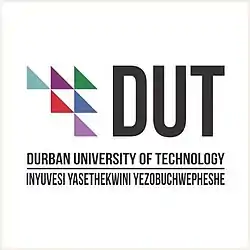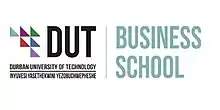Durban University of Technology
The Durban University of Technology (DUT) is a University in KwaZulu Natal, South Africa. It was formed in 2002 following the merger of Technikon Natal and ML Sultan Technikon and it was initially known as the Durban Institute of Technology. It has five campuses in Durban, and two in Pietermaritzburg. In July 2019, approximately 33932 students were enrolled to study at DUT. The University is one of 5 technical institutions on the African continent to offer Doctoral Degrees. The current Chancellor is Ms Nonkululeko Nyembezi.
Inyuvesi yasethekwini yezobuchwepheshe | |
 | |
| Motto | Achieving greatness together |
|---|---|
| Type | Public University of Technology |
| Established | 2002 |
| Vice-Chancellor | Professor Thandwa Mthembu |
Administrative staff | 2647 |
| Students | 30400 |
| Location | , , South Africa |
| Sports | Deans cup & Varsity Cup |
| Website | www.dut.ac.za |
History
The Durban University of Technology is a result of the merger, in April 2002, of two technikons, ML Sultan and Technikon Natal. It was named the Durban Institute of Technology and later became the Durban University of Technology in 2007.[1]
KwaZulu-Natal's Indian population began arriving in the 1860s to primarily work as indentured labourers on the sugar plantations. In 1927, those with no formal educational qualifications were threatened with repatriation. This threat stimulated adult classes in literacy, as well as a range of commercial subjects, held in a mission school and a Hindu Institute, but it was not until after the Second World War, and thanks to substantial financial support from the public, that ML Sultan College came into being. It would be another decade, however, before the City Council, now preoccupied with the structures of the first Group Areas Act of 1950, allocated suitable land for a permanent campus.[1]
The Natal Technical College was founded in 1907 and immediately began providing tuition to more than 350 part-time students. The structures of apartheid as it was codified through legislation weighed heavily on this institution as well. In 1955 the college was taken over by national education authorities; and in 1967 it became an exclusively white institution.[1]
In 2019, Mlungisi Madonsela, a business administration student, was shot and killed during a protest, allegedly by private security guards.[2]

Councils
- Mr Wiseman Madinane is the Chairperson of the University Council.
- Ms Dudu Hlatshwayo is the Deputy Chairperson of the University Council.
The DUT student body elects a Student Representative Council annually.
Campuses
- Brickfield Campus, Durban
- City Campus, Durban
- Indumiso Campus, Pietermaritzburg
- ML Sultan Campus, Durban
- Ritson Campus, Durban
- Riverside Campus, Pietermaritzburg
- Steve Biko Campus, Durban
Academics
In 2019, the university employed 841 academic staff, 51 percent of them female and 48 percent holding masters and 43 percent doctoral degrees.[1]
Professor Thandwa Mthembu is the Vice-Chancellor and Principal of DUT. Some of the other senior members of the leadership team include:
- Professor Thandi Gwele, Deputy Vice-Chancellor: Teaching & Learning
- Professor Sibusiso Moyo, Deputy Vice-Chancellor: Research, Innovation & Engagement
- Dr Isaac Machi, Deputy Vice-Chancellor, People & Operations
- Dr Thiru Pillay, Registrar
The six faculties include:
- Faculty of Accounting & Informatics
- Faculty of Applied Sciences
- Faculty of Arts & Design
- Faculty of Engineering & the Built Environment
- Faculty of Health Sciences
- Faculty of Management Sciences
Each Faculty is led by an Executive Dean. The academic ambit of DUT resides under the Deputy Vice-Chancellor: Teaching & Learning.
DUT Business School
The Durban University of Technology launches its Business School in 2021. The School offers its new Masters of Business Administration (MBA) programme, Postgraduate Diploma in Business Administration (PDBA) programmes, Higher Certificates programmes and a variety of Executive Education and short learning programmes. The DUT Business School also designs tailor-made, in-house programmes and collaborates with corporate, public and non-profit organisations to develop and capacitate employees in various areas.

Student enrolment
Whilst the Durban University of Technology offers contact learning, DUT is also a member of COIL, which is the Collaborative Online International Learning consortium.
In 2017, there were 29,496 contact students, 24,545 of whom were full-time and 4,951 were part-time. Of these, 28,905 were South African citizens, 426 from other SADC countries, and 165 from non-SADC countries (actual data, 2017).
Rankings
| University rankings | |
|---|---|
| Global – Overall | |
| THE World[3] | 401-500 (2021) |
In 2020, the university was ranked by the Times Higher Education World University Rankings for the first time in its history. It ranked within the top 500 universities in the world, and within the top 5 in South Africa. It was also the first time in history that the province had two universities rank within the top 5 in the country.[4][5]
Notable Alumni
The University has a large Alumni body. Mr Wiseman Madinane is the current President of the Convocation and Chairperson of the Convocation Executive. The University has a list of famous Alumni, including Gordon Murray, Mpume Langa, Jeremy Maggs, Sphelele Ngubane, Alan Khan, Sean Wisedale, Donovan Prinsloo, Nokuthula Sibiya, Siphumelele Zondi, Deena Naidoo, Aakash Bramdeo, Maud Blose, Keeolin Naicker, Thabo Dlamini, Schabir Shaik, and Lance Klusener amongst many others.
- Nthati Moshesh - Actress
- Celeste Ntuli - comedienne and actress
- Black Coffee (DJ) - DJ, record producer, singer and songwriter
- Zakes Bantwini - Multi-award-winning singer, record producer and businessman
- Sarah Richards - Sculptor
- Bongiwe Msomi - South Africa national netball team player
- Candice Forword - Field hockey forward for the South Africa women's national field hockey team
- Billy Nair - Politician, a member of the National Assembly of South Africa, an Anti-Apartheid Movement activist and a political prisoner in Robben Island.
- Berry Bickle - Artist
- Zwakele Mncwango - Politician, Provincial Leader of KwaZulu-Natal Democratic Alliance (South Africa) (DA)
- Babalo Madikizela - Politician, Eastern Cape MEC for Public Works since May 2019 and a Member of the Eastern Cape Provincial Legislature since November 2018, provincial treasurer of the African National Congress (ANC) since October 2017.
- Mandisa Mashego - Politician, A member of the Economic Freedom Fighters, party's provincial chairperson in Gauteng from 2018 to 2020, Member of the Gauteng Provincial Legislature from 2014 to 2020.
References
- "Durban University of Technology". Sarua.org. Retrieved 2012-08-03.
- "NPA TO REVIEW CASE INTO DEATH OF DUT STUDENT MLUNGISI MADONSELA". Eyewitness News. Primedia Broadcasting. Retrieved 10 October 2019.
- "Durban University of Technology". Times Higher Education World University Rankings. Retrieved 5 September 2020.
- https://www.timeshighereducation.com/world-university-rankings/2021/world-ranking#!/page/0/length/25/sort_by/rank/sort_order/asc/cols/stats
- https://www.dut.ac.za/dut-is-one-of-the-five-top-south-african-universities-among-the-finest-in-the-world/